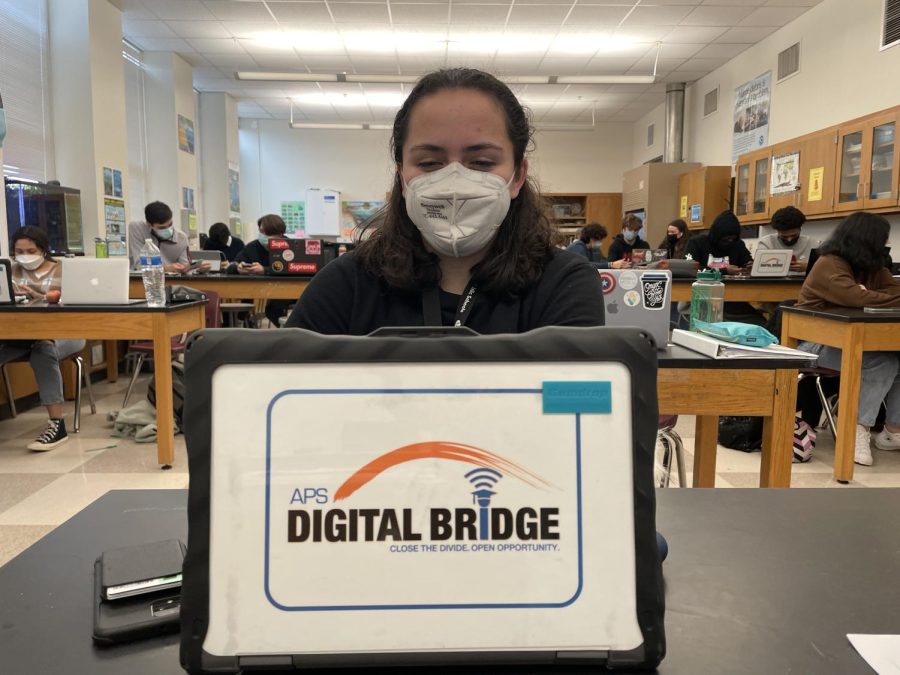Senior Nola Pickering uses her school-issued Chromebook in her AP Biology class.
Head to Head: Should students be required to use their school-issued Chromebooks?
February 7, 2022
At the beginning of the school year, Atlanta Public Schools took a stride to provide educational resources to all students and close the digital divide by issuing each student a personal Chromebook. However, despite the fact that each student now has a school-issued Chromebook, some students continue to use their personal laptops at school. Co-Editor-in-Chief Anna Rachwalski and Comment Managing Editor Marcus Johnson take sides on whether students should be required to use their school-issued Chromebooks at school.
Personal computers allow students to bypass Chromebook frustrations
At the beginning of this school year, Atlanta Public Schools provided every Midtown student with a Chromebook. These laptops were meant to revolutionize students’ learning and bring classrooms into the 21st century. That ideal has not succeeded.
On a school Chromebook, it can take up to 15 minutes to log on, connect to WiFi and pull up a website. Every time a student closes a school laptop, no matter how briefly, it completely logs them out of their computer. This requires the student to re-login and open all of their tabs again, wasting precious class time.
Despite the technological frustrations associated with school computers, many teachers at Midtown require students to use their Chromebooks and don’t allow the use of personal computers. Banning personal computers does enforce a level technological playing field for students, and ensures that no student has an unfair advantage due to their use of more updated technology. Furthermore, requiring school computers helps to prevent cheating, as teachers can view, in real-time, what is happening in students’ browsers by using the software Securly.
However, on days that students aren’t taking assessments, there is no reason to ban them from using personal computers. By forcing students to use their Chromebooks, teachers are ultimately slowing students down and preventing them from using resources that may help them do better.
School Chromebooks are often so encumbered by web restrictions that they are unusable for many academic activities, particularly research. Even some websites run by APS, such as the website of the APS Office of Student Assignments and Records, are inaccessible on school computers.
School-provided laptops are also incredibly clunky. With its protective case (that students aren’t allowed to take off) the laptop weighs roughly 4 pounds. That’s equivalent to carrying five cans of soup around Midtown all day.
Furthermore, students have limited access to images on their Chromebooks while on school WiFi. If students have a presentation or collage to make for class, they aren’t able to fully complete the assignment, often costing them points when these assignments are being graded. In addition, YouTube videos remain inaccessible to students on their school computers, even though many teachers integrate videos into their lesson plans.
Banning personal computers also hinders students from taking part in extracurriculars. For example, students who participate in programs like Robotics are not able to download and run crucial software on their school computers. Yearbook staffers use a specific website, Yearbook Avenue, to create the yearbook. On Chromebooks, the website is slow and unusable.
In order to bypass these restrictions and increase their productivity, many students bring and use their personal computers at school. It’s faster and more convenient to use a computer that they know is reliable and won’t falter while performing simple tasks.
If students are already carrying around their personal computer, either for the sake of productivity or for an extracurricular, why shouldn’t they be allowed to use them for non-assessment assignments? Ultimately, banning personal computers hampers students who are trying to be more productive and engaged members of the Midtown community.

Anna Rachwalski is a senior and this is her third year writing for the Southerner. Outside of the newspaper, she is president of the Quiz Bowl team, is...
Requiring school-issued computers creates level academic playing field
Atlanta Public Schools took a necessary stride to provide educational resources to all students and close the digital divide by issuing each student a personal Chromebook at the start of the school year.
However, many students are still being left behind, as others opt to use their personal laptops instead of their school-issued devices. Requiring that all students use their Chromebooks is the next step in ensuring that all students have the same tools needed to succeed in the classroom.
Some teachers have already begun requiring students to bring their Chromebooks instead of their personal laptops in order to prevent cheating. Each Chromebook comes with the software Securly, which allows teachers to monitor students’ activity and confirm that they are on task rather than simply finding the answers online. Teachers will often use the software to monitor students during tests and other assessments, but students who use their own computers do not have this same surveillance. This makes it much easier for those with personal laptops to cheat during these tests, and gives them an unfair academic advantage.
However, whether or not students are required to bring their school-issued Chromebooks should not be an issue that is settled on a teacher-by-teacher or day-by-day basis. This only creates unnecessary difficulties for everyone involved. Students have to keep up with the dates when they need to bring their Chromebook versus when they can bring their personal laptop, and teachers have to resolve issues with students who forget to bring their Chromebook on days when it is required, a regular occurrence that many teachers must deal with.
To alleviate this issue, the school administration should step in and make the use of the Chromebooks a school-wide requirement, easing the confusion of when students need to bring their Chromebooks and following through on the reason behind providing them to all students in the first place.
These school computers are by no means perfect, and some students’ personal laptops may be better suited for certain tasks. For example, some websites, including YouTube, cannot be accessed on the school-issued computers, and some students may have software downloaded to their personal laptops that they do not have access to on their Chromebook. The school should work to provide students with more tools to help them in the classroom, including access to currently restricted resources and software that some students need for certain activities, but they must also ensure that the tools already at students’ disposal are as equal as possible among all students.
Although some students are frustrated with the limitations of the school-issued computers, APS has intentionally placed restrictions and regulations on what students can do on their Chromebooks in order to emphasize security and prevent students from accessing non-educational materials.
If these restrictions are to be imposed equally on all students, and not just those who cannot afford to bypass them by means of their own personal laptop, the school must make sure that all students are using the school-issued computers.
Requiring students to use their school-issued Chromebooks rather than their personal laptops puts every student on a level academic playing field by preventing cheating and giving students equal technological capabilities. While these Chromebooks are beneficial to students who otherwise would not have access to a computer and assist in closing the digital divide, without a school-wide requirement for all students to use them, students who bring in their own personal laptops will continue to be at an unfair and significant academic advantage.

Marcus Johnson is a senior in his third year on the Southerner. When he's not hard at work writing, he runs cross country and track for Midtown and plays...
